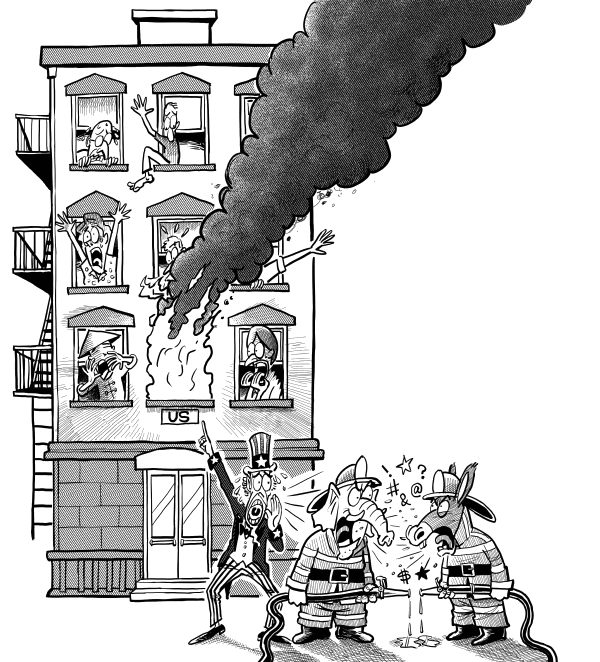Can We Talk?
A Liberal Tries to Understand the Tea Party

“Millions of Americans are rising up to reclaim our country, defend our liberty, and restore the Constitution,” says Ted Cruz, the latest Tea Party insurgent to knock off a favored Republican establishment candidate. Cruz, who won the Republican nomination for the Senate in Texas, is a Harvard-educated son of Cuban immigrants, with a long background of working in government. In other words, Cruz wants to whittle down the organizations that nurtured and employed him throughout most of his career. And whom is he defending our liberty against? Well, me, I guess.
Why? Because I believe:
— in the efficacy and promise of a government that regulates and redistributes wealth in a just manner;
— government (education) is the critical instrument to limiting the ossification of social classes in the United States;
— government provides directly or indirectly for those who cannot provide for themselves; and
— government is necessary to protect us against our enemies and unbridled capitalism (ourselves).
But I also believe in liberty and think that a government that governs less governs best.

You would think that I, and liberals like me, could find common ground with Tea Party adherents on these keys points. I would say, okay, let’s talk about how we can make government more efficient and better accomplish the things that government needs to do.
What do you think the answer would be? If we are to judge by the actions of the U.S. Congress and the words of Tea Party members, there can be no compromise, because, in their view, I want to take away some of their liberties.
Okay, I tell myself, don’t throw your hands up and walk away thinking these people are nuts; try and understand their points of view, which are, as nearly as I can tell, that any government regulation or taking of your property (taxes) comprise an unconstitutional limiting or elimination of their liberties.
If you see it like that, you can begin to understand the vehemence and unwillingness to compromise. How can I ask you to give up a liberty to pay for the early childhood education of a child who, according to the University of North Carolina, is four times as likely to earn college degrees if she’s had early childhood education?
And what is this liberty I am asking you to give up? This is where I get a bit stuck, but I’ll try.
The liberty you are being asked to sacrifice is control of your life, by giving that control over to the government (what conservatives call the “nanny state”). You are being asked by the society that provides for your personal safety, infrastructure, and health (what liberals call the “common good”) to contribute to the welfare of another member of that society. Would these activities be performed in as efficiently a manner by volunteerism or capitalism: If there is a market for roads, will they be built?
Maybe some things would. We have spent the years since the Reagan Administration experimenting with privatization of everything from prisons to water services and sanitation. What are these effects of privatization? In the case of prisons, according to the Bureau of Justice Assistance, savings have been gained through “reductions in staffing patterns, fringe benefits, and other labor-related costs.”
The area of pensions and the lifestyles of government employees is where, I think, the Tea Party anti-big-government mentality might ultimately have its greatest impact, and where it derives much of its energy. The benefits of a government job, with health care, retirement, and vacation, are a vestige of an age when these benefits were also common in the private sector. Today’s world of no job security, stolen pension funds, and high-cost health insurance in the private sector makes government pay and benefits seem unfair and out of step with the realities of the modern economy.
The result of the kinds of reforms envisioned by the Tea Party, I fear, will be to make government employees just as insecurity-driven, high performing, and efficient as their private counterparts. This, the Tea Party would say, will make us all richer just as they have made their bosses richer.
I would prefer restoring the benefits and security to the private workplace over taking them away from the public sector, but that would require government interfering in the marketplace. And that is a big Tea Party “No!”
I don’t expect we will be seeing better government and social improvements. I bet Senate nominee Ted Cruz would say it will be better when we have less taxes, government regulations, and government intrusion into our lives. Sounds good to me if you can also provide for the common good. I don’t think you can with fewer and more stressed employees in the public sector.
I’ll keeping listening and trying to understand so I can make a better argument in the hope that, someday, solving problems will be more important than wrecking government services.
One final question concerning our liberties, for those of you working on the Cruz campaign or organizing against government: Is it government who is collecting the most information about you? Or is it big business and big politics? Is it government or business that is protecting you against these intrusions into your constitutional privacy rights?



